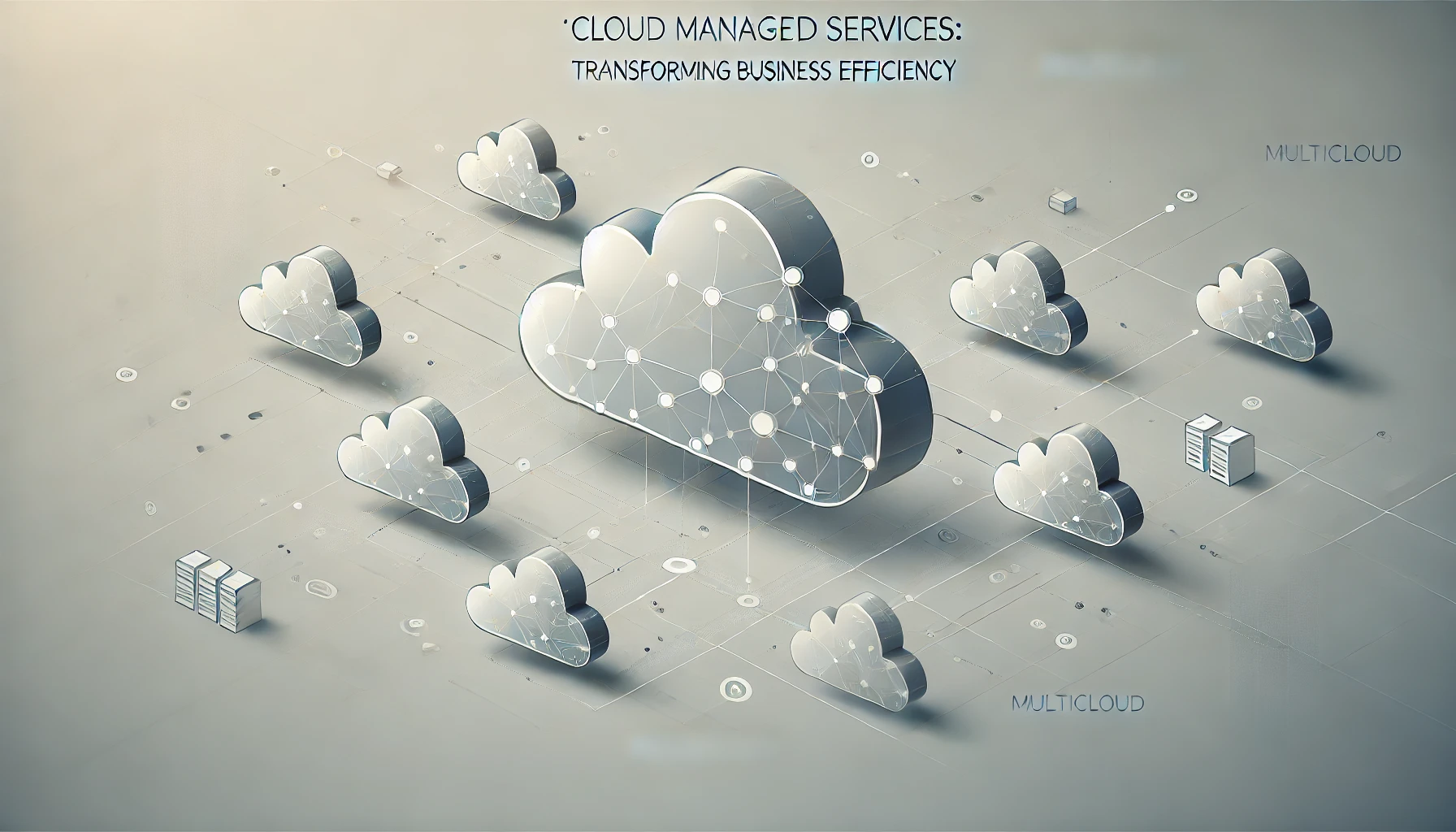
Transcloud
November 27, 2024

November 27, 2024
“When it comes to running a business, staying ahead of technology challenges is crucial. Managed services offer a practical solution to streamline operations, reduce risks, and enable your team to focus on what truly matters. With expert support and the right infrastructure, you can stay competitive without the overhead of managing everything in-house. Here’s what you need to know.
Managed services involve the outsourced management and support of a business’s various operations and functions. Instead of handling everything in-house, businesses hire managed service providers (MSPs) to oversee tasks that are critical but not central to their core mission. This approach allows companies to focus on their primary objectives while benefiting from specialized expertise, cost-effective solutions, and improved risk management.
The primary components of managed services include proactive monitoring, maintenance, and support. These functions are designed to prevent issues before they arise, ensuring seamless operation. By employing Service Level Agreements (SLAs), businesses can define the expected quality of service and the responsibilities of the MSP, ensuring accountability and reliability. A significant part of managed services is the strategic planning and implementation of technology solutions that align with the business’s goals and growth plan.
IT Infrastructure
Managed IT infrastructure services encompass hardware and software maintenance, system monitoring, and IT support. MSPs ensure the smooth functioning of servers, workstations, and networks, minimizing downtime and disruptions. To Know More about our infrastructure services.
Cloud Services
Cloud services management includes the configuration, optimization, and maintenance of cloud environments. MSPs offer solutions like cloud storage, virtual servers, and software as a service (SaaS), enabling businesses to scale efficiently without hefty investments in physical infrastructure.
Security Services
Security services protect against cyber threats and data breaches. They include firewall management, intrusion detection, vulnerability assessments, and compliance monitoring. MSPs provide robust security measures tailored to protect business-sensitive information and maintain regulatory compliance.
Network Management
Network management services ensure seamless connectivity and performance of a company’s IT network. They involve monitoring network traffic, managing routers and switches, and troubleshooting connectivity issues to prevent costly downtimes.
Data Backup and Recovery
These services provide systematic data backup and disaster recovery solutions. With managed data services, businesses can secure their vital data through regular automated backups and have recovery plans ready in case of data loss or corruption.
Understanding these managed service types empowers businesses to select the solutions that meet their unique operational demands, driving productivity and growth.
Cost-effectiveness
Managed services offer a cost-effective solution that can save businesses significant expenses. Instead of hiring a full-time IT staff, you can access a team of experts for a fraction of the cost. This not only reduces overhead but also allows businesses to allocate funds to other critical areas, driving overall growth.
Scalability
As your business grows, so do your IT needs. Managed services offer scalability, enabling you to expand your IT infrastructure without the stress of managing additional resources. Whether you need more storage, enhanced security, or improved network capabilities, managed services can quickly adapt to your evolving demands.
Expertise and Support
Managed Service Providers (MSPs) bring expertise and support to the table. With a team of seasoned professionals, you can rest assured that your IT systems are in capable hands. This expertise ensures that your business stays ahead of industry trends and technological advancements.
Increased Productivity
By leveraging managed services, your team can focus on core business activities without being bogged down by IT issues. The result is increased productivity, as employees can dedicate their time to innovation and development rather than troubleshooting technical problems.
Risk Management
Managed services play a crucial role in risk management by implementing robust security measures and compliance protocols. With proactive planning and monitoring, MSPs help mitigate risks associated with data breaches, ensuring your business is safeguarded from potential threats.
Proactive Monitoring and Maintenance
Continuous monitoring and proactive maintenance are the hallmarks of managed services. By keeping a close eye on your IT systems, MSPs can identify potential issues before they escalate into significant problems, minimizing downtime and ensuring seamless operations.
Outsourcing vs In-House Management
The decision between outsourcing and in-house management is pivotal. With managed services, outsourcing allows businesses to focus on their core competencies while leaving the complexities of IT management to specialized professionals. In contrast, in-house management often demands more resources, time, and manpower, which may not always be feasible for growing enterprises. For a deeper understanding of this decision, read our In-House vs Outsource Blog.
Service Level Agreements (SLAs)
A cornerstone of how managed services function is through Service Level Agreements (SLAs). These agreements define the expected level of service, performance metrics, and responsibilities of the MSP. SLAs ensure clarity and accountability, providing businesses with a comprehensive framework to measure the effectiveness of the services received.
Managed Service Providers (MSPs)
Role and Importance
Managed Service Providers (MSPs) are the linchpins in the world of IT solutions, offering businesses essential support and expertise. These providers manage a variety of services, including IT infrastructure, cloud solutions, and security services. The role of MSPs is crucial as they offer specialized capabilities that most in-house teams lack. By outsourcing to an MSP, companies gain access to top-tier technology and knowledgeable technicians without needing a hefty investment in training or employing full-time staff. This leads to enhanced business operations and a stronger focus on core business strategies. Furthermore, MSPs ensure continuous monitoring and maintenance, proactively minimizing risks before they escalate into costly downtime.
Considerations for Choosing an MSP
Selecting the right MSP is a pivotal decision. Here are key considerations:
For Small Businesses
By leveraging managed services, small businesses gain access to IT support and expertise that they might not be able to afford in-house. Managed services help streamline operations and ensure IT solutions are optimized for efficiency and security, allowing business owners to focus on growth without getting bogged down by technical hurdles. Managed services provide cost-effective IT support, enhancing productivity and minimizing downtime.
Remote and Hybrid Work Environments
In today’s dynamic work environments, managed services are indispensable. They provide the necessary IT solutions for teams spread across various locations. Whether remote or hybrid, managed services ensure secure network management, data backup, and cybersecurity measures. This guarantees seamless communication, collaboration, and data integrity regardless of where employees are working. Managed services help maintain a consistent IT experience, enhancing productivity and mitigating risks associated with remote operations.
Key Factors: Experience and Expertise
When choosing a Managed Service Provider, experience and expertise should top your criteria list. Look for MSPs with a proven track record in your industry. An experienced provider brings valuable insights and innovative solutions tailored to your business’s unique needs. Expertise ensures that complex challenges are addressed efficiently, minimizing disruptions and enhancing your IT infrastructure’s overall performance. For more information on how we can support your business with expert managed services, visit our Managed Services Page.
Industry Focus
The industry focus of an MSP is crucial. A provider with a deep understanding of your industry’s specific challenges and regulations will offer more effective solutions. They can deliver tailored IT support that aligns with your business goals and compliance requirements. Selecting an MSP versed in your industry’s nuances ensures a strategic partnership, providing the tools and insights necessary to drive your business forward effectively.
Potential Issues to Address
While managed services offer numerous advantages, they are not without challenges. Businesses might encounter issues such as dependency on service providers, potential loss of control over certain IT functions, and possible data security concerns. Additionally, there may be a mismatch between the services offered and the unique needs of a business. Service limitations can sometimes arise, resulting in dissatisfaction if expectations are not adequately managed.
Strategies for Mitigation
To mitigate these challenges, businesses should take several proactive steps. First, establish clear communication with your managed service provider to align on goals and expectations. Draft comprehensive Service Level Agreements (SLAs) to ensure that all service commitments are documented and understood. Regularly review performance metrics and provide feedback to the provider. Encourage a collaborative relationship where both parties work toward mutual success. Additionally, seek out providers with a proven track record in your industry, ensuring they possess the necessary expertise to address your specific needs.
As we look toward the future, managed services are set to evolve dramatically, driven by technological innovation and changing business needs. Two major trends on the horizon are AI and automation, and cybersecurity advancements. These will redefine the landscape of managed services, offering businesses enhanced efficiency and security.
AI and Automation
AI and automation are becoming the backbone of managed services. By automating routine tasks, AI reduces human error and accelerates service delivery. Here’s how AI and automation will transform managed services:
These technologies not only increase efficiency but also ensure to stay competitive. Know More…
Cybersecurity Advancements
In an era of increasing cyber threats, managed services must prioritize cybersecurity advancements. They will play a crucial role in safeguarding sensitive data and systems. Here are key areas of focus:
By embracing these advancements, businesses can strengthen their defense mechanisms, ensuring compliance and security in an ever-evolving digital landscape. Managed services equipped with the latest cybersecurity measures will be indispensable in protecting business interests.
Leveraging the potential of managed services the potential of managed services goes beyond simply selecting an IT solution; it’s about making a strategic choice that drives business growth. With managed services, businesses gain access to flexible, expert support tailored to their needs, enabling them to focus on core goals, enhance productivity, and navigate risks more effectively. For both small businesses and scaling enterprises, managed services provide a structured pathway to sustainable growth in the digital age. As a trusted Google Cloud Partner, Transcloud brings industry-leading expertise and personalized support to help companies leverage Google Cloud Platform (GCP) for seamless, scalable success.
10 Essential Questions to Ask Before Choosing a Cloud-Managed Service Provider.
In a fast-paced and ever-evolving business landscape, staying ahead of the curve requires more than just keeping up with trends—it’s about leveraging the right technology to fuel growth and innovation. The choices you make in cloud solutions can be the key to unlocking your company’s true potential, giving you the edge needed to thrive in a digital-first world.
Let’s explore why choosing the right cloud-managed service provider isn’t just a decision—it’s a game changer!One of the most effective ways for businesses to ensure optimal performance and scalability is by leveraging cloud-managed services.
These services allow companies to focus on their core objectives, while outsourcing critical IT functions to specialized providers who can deliver expert support, security, and cost efficiency.Choosing the right cloud-managed service provider (MSP) is a pivotal decision for any business. It’s essential to evaluate providers carefully to ensure that they meet your unique business needs and align with your strategic goals. To help you make an informed choice, here are 10 essential questions you should ask before selecting an MSP.
10 Essentials Questions to Ask Your Cloud-Managed Service Provider
Why Choose Transcloud for Your Cloud-Managed Services
Cloud-managed services are no longer optional; they are a necessity for businesses aiming to remain competitive, agile, and future-ready. Partnering with a trusted provider like Transcloud ensures you not only stay ahead but also thrive in the evolving digital landscape. With Transcloud, you gain access to secure, scalable, and customized cloud solutions backed by our deep expertise as a Google Cloud Premier Partner in India.
Our cloud solutions empower your internal teams to focus on driving innovation and growth, while we manage your cloud infrastructure with precision and reliability. Whether you are a small business or a large enterprise, we help you optimize costs, minimize downtime, and position your business at the forefront of cloud innovation.
Partner with Transcloud today and revolutionize your cloud strategy. From hybrid cloud solutions to advanced AI and machine learning on Google Cloud Platform (GCP), we unlock the full potential of your business through digital transformation.


